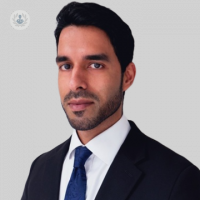Demystifying strokes: Understanding, recognising, and preventing
Escrito por:Strokes are a critical medical condition that can affect anyone, regardless of age or gender. In his latest online article, leading consultant physician in stroke, geriatric and general internal medicine Dr Arup Sen explains what causes a stroke, how to recognise the warning signs, how to identify potential triggers, and tells us about prevention measures that can be vital for your overall health and well-being.

What causes a stroke?
A stroke occurs when there is a disruption in the blood supply to the brain. This can happen in two main ways:
- Ischaemic Stroke: The most common type, accounting for around 85% of all strokes, happens when a blood clot or plaque buildup narrows or blocks an artery supplying the brain. As a result, brain cells are deprived of oxygen and nutrients.
- Haemorrhagic Stroke: This type is less common but more severe. It occurs when a blood vessel in the brain ruptures and causes bleeding within the brain tissue. The excess blood puts pressure on the brain and damages surrounding cells.
What are the warning signs of a stroke?
Recognising the signs of a stroke and acting quickly is crucial for minimising damage and improving outcomes. The acronym "FAST" can help you remember the common warning signs:
- Face drooping: One side of the face may droop, making it difficult to smile.
- Arm weakness: One arm may become weak or numb, making it hard to raise.
- Speech difficulty: Speech may become slurred or incoherent.
- Time to call emergency services: If you observe any of these signs, it's vital to call 999 (or emergency services in your country) immediately.
In addition to FAST, other symptoms of a stroke may include sudden severe headaches, confusion, trouble seeing in one or both eyes, dizziness, and difficulty walking or maintaining balance.
What can trigger a stroke?
Several factors can increase your risk of having a stroke, including:
- High blood pressure: Uncontrolled hypertension is the leading cause of strokes. Keeping your blood pressure within a healthy range is essential.
- Smoking: Smoking damages blood vessels, increasing the risk of clot formation.
- Diabetes: High blood sugar levels can damage blood vessels over time, increasing stroke risk.
- Obesity: Excess body weight can lead to conditions like hypertension, diabetes, and high cholesterol, all of which raise the risk of stroke.
- Heart disease: Conditions like atrial fibrillation, heart valve disorders, and a history of heart attacks can increase stroke risk.
How can I prevent a stroke?
Reducing your risk of stroke involves making healthy lifestyle choices:
- Manage blood pressure: Regularly check your blood pressure and follow your doctor's advice to keep it under control.
- Quit smoking: If you smoke, quitting is one of the most effective ways to reduce your stroke risk.
- Control diabetes: Monitor your blood sugar levels and follow your doctor’s recommendations.
- Maintain a healthy diet: A balanced diet rich in fruits, vegetables, whole grains, and lean proteins can help reduce stroke risk.
- Stay physically active: Regular exercise can improve your overall health and lower your risk of stroke.
- Limit alcohol intake: Excessive alcohol consumption can raise blood pressure and contribute to stroke risk. Moderation is key.
How likely Is a second stroke?
If you've already had a stroke, your risk of having a second one is higher. However, taking steps to manage your risk factors, such as those mentioned above, can significantly reduce the likelihood of recurrence. Your doctor’s provider will work with you to develop a personalised plan to minimise this risk.
A stroke is a critical medical emergency with the potential for life-changing repercussions. Understanding the causes, recognising warning signs, and taking preventive measures are essential for maintaining good health and reducing your risk of a stroke. If you or someone you know experiences stroke symptoms, don't hesitate to seek immediate medical attention, as early intervention can save lives and minimise the long-term effects of a stroke.
If you would like to book a consultation with Dr Arup Sen, you can do so today via his Top Doctors profile.


